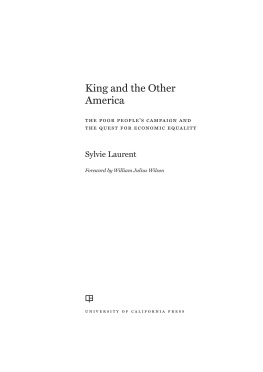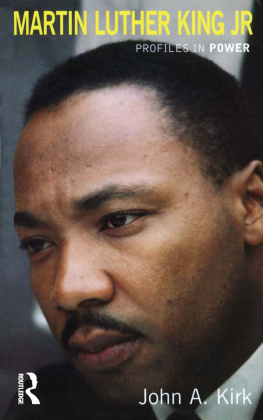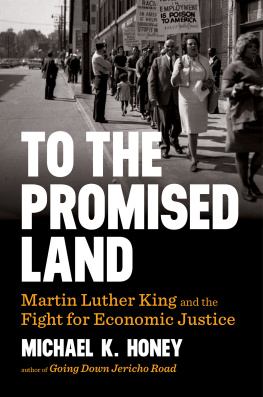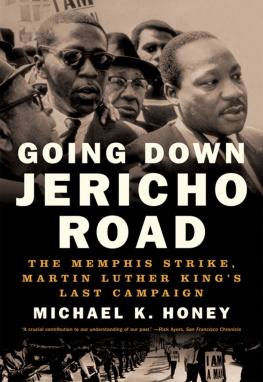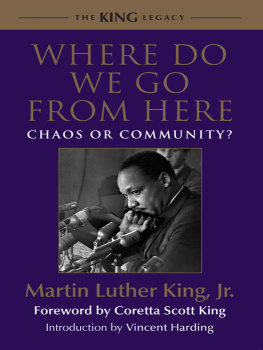The publisher and the University of California Press Foundation gratefully acknowledge the generous support of the George Gund Foundation Imprint in African American Studies.
King and the Other America
THE POOR PEOPLES CAMPAIGN AND THE QUEST FOR ECONOMIC EQUALITY
Sylvie Laurent
Foreword by William Julius Wilson

UNIVERSITY OF CALIFORNIA PRESS
University of California Press, one of the most distinguished university presses in the United States, enriches lives around the world by advancing scholarship in the humanities, social sciences, and natural sciences. Its activities are supported by the UC Press Foundation and by philanthropic contributions from individuals and institutions. For more information, visit www.ucpress.edu.
University of California Press
Oakland, California
2018 by The Regents of the University of California
Library of Congress Cataloging-in-Publication Data
Names: Laurent, Sylvie, author. | Wilson, William J., 1935 writer of supplementary textual content.
Title: King and the other America : the Poor Peoples Campaign and the quest for economic equality / Sylvie Laurent ; foreword by William Julius Wilson.
Description: Oakland, California : University of California Press, [2018] |
Includes bibliographical references and index. | Identifiers: LCCN 2018015301 (print) | LCCN 2018018593 (ebook) | ISBN 9780520963436 (epub and ePDF) | ISBN 9780520288560 (cloth : alk. paper) | ISBN 9780520288577 (pbk. : alk. paper)
Subjects: LCSH : EqualityUnited States. | PoorUnited States. | Poor Peoples Campaign. | King, Martin Luther, Jr., 19291968Influence.
Classification: LCC HN 90.S6 (ebook) | LCC HN 90. S 6 L 35 2018 (print) | DDC 305.5/690973dc23
LC record available at https://lccn.loc.gov/2018015301
Manufactured in the United States of America
26 25 24 23 22 21 20 19 18
10 9 8 7 6 5 4 3 2 1
In a sense, you could say we are engaged in a class struggle, yes. It will be a long and difficult struggle, for our program calls for a redistribution of economic power. Yet this isnt a purely materialistic or class concern. I feel that this movement in behalf of the poor is the most moral thingit is saying that every man is an heir to a legacy of dignity and worth.
Martin Luther King, Jr. (March 1968)
I was about 11 years old; my family lived in one of the suburbs outside Washington DC. My father took my sister and me to Tent City one Sunday after church. Friends and family told him he was crazy, irresponsible to take two young girls down there. Nope, my father said, I want my children to see and understand what is really going on in this country. My experience of walking around the fringes of Tent City on the Mall that sunny afternoon was one of the most formative experiences of my early life. My first visual impression of Tent City from a distance is embedded forever in my mind.
Irene Jarosewich (November 2012)
Contents
Foreword
Sylvie Laurents King and the Other America will change the way we think about Martin Luther King Jr.s valiant efforts to combat inequality. Works on MLK and his legacy have focused mainly on his efforts to ensure that individuals seeking desired goals and opportunities be judged solely on the basis of individual merit and therefore ought not be discriminated against on the basis of race or ethnicity. However, as Laurent so clearly points out, in the second half of the 1960s King and several other prominent black spokespersons, such as Bayard Rustin and Kenneth B. Clark, began to realize that programs based solely on the principle of individual opportunity were inadequate to address the complex problems of racial inequality in America.
These insightful observers made it clear that from 1955 to 1965 the civil rights movements chief objectives were to integrate public accommodations and eliminate black disfranchisement. These were basic issues of constitutional rights and human dignity that primarily affected African Americans and other people of color, and therefore could be defined and addressed simply as problems of civil rights. However, King and other perceptive observers noted that despite the spectacular civil rights victories during the first half of the 1960s, a more fundamental and complex
This particular emphasis on the problems of inequality relates to what the political philosopher James Fishkin calls the principle of equality of life chances.
The major factor distinguishing the principle of equality of life chances from the principle of equality of individual opportunity is that the problems of the more disadvantaged individualsclass background, low income, inadequate housing, poor education, a broken home, and cultural or linguistic differencesmay not be clearly related to prior discrimination. Nonetheless, children reared in homes impacted by these disadvantages may be denied an equal chance in life because their circumstances effectively impede the development of their talents and aspirations.
Sylvie Laurents King and the Other America brilliantly captures the evolution and crystallization of Kings philosophy, from an emphasis on the equality of individual opportunity to a focus on the equality of life chances, and how this shift in philosophy was embodied in his 1968 Poor Peoples Campaign. As Laurent points out, although King expressed concerns about economic injustice even before he set in motion the Montgomery bus boycott in 1956, his forceful articulation of these concerns accompanied the introduction and unfolding of his Poor Peoples Campaign. This last crusade for justice, in harmony with his simultaneous support of the Memphis sanitation workers, focused on the misery and injustice of the poor and of the working classes of all races and ethnicities. However, the progressive populist demands of an interracial Poor Peoples Campaign were at first overshadowed by his death and then faded swiftly from political memory.
In dismissing the Poor Peoples Campaign as a debacle, historians and civil rights activists have failed to capture the import of Kings reframing of the civil rights movement in economic and redistributive terms. Sylvie Laurent effectively brings to center stage the significance of the Poor Peoples Campaign and the culmination of Kings views on equality. This thought-provoking book also details the intellectual roots of Kings highly egalitarian, social democratic vision of society, including the inspiration King drew from activist social movements fighting poverty, racial injustice, and wealth disparities, as well as their calls for fundamental redistributive policies. Moreover, Kings Poor Peoples Campaign and his developing social democratic vision of society are insightfully revisited through the lens of contemporary social science scholarship, which examine various aspects of social and economic inequality.
In the age of Donald Trump, the publication of Sylvie Laurents King and the Other America is very timely. Thoughtful readers will quickly realize that Kings evolving arguments in the formulation of his Poor Peoples Campaign, arguments on how the problems of ordinary Americans can be addressed in an era of rising inequality and that are consistent with Fishkins principle of equality of life chances, are just as relevant in todays political climate. King advanced an inclusive populist message on the eve on his Poor Peoples Campaign, a message that makes us more aware of the concerns that ordinary Americans of all racial and ethnic groups share todayincluding concerns about declining real wages, job security and unemployment, escalating medical and housing costs, the availability of affordable childcare programs, and pensions or retirement security.

